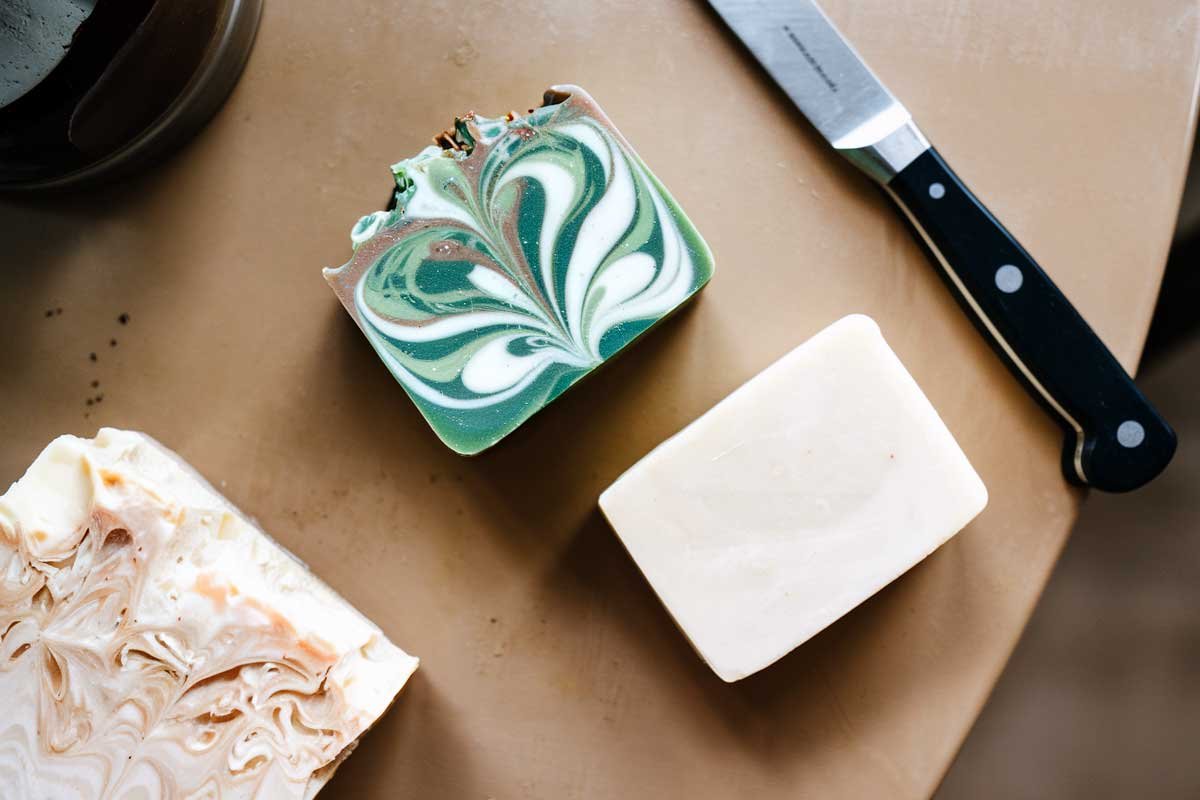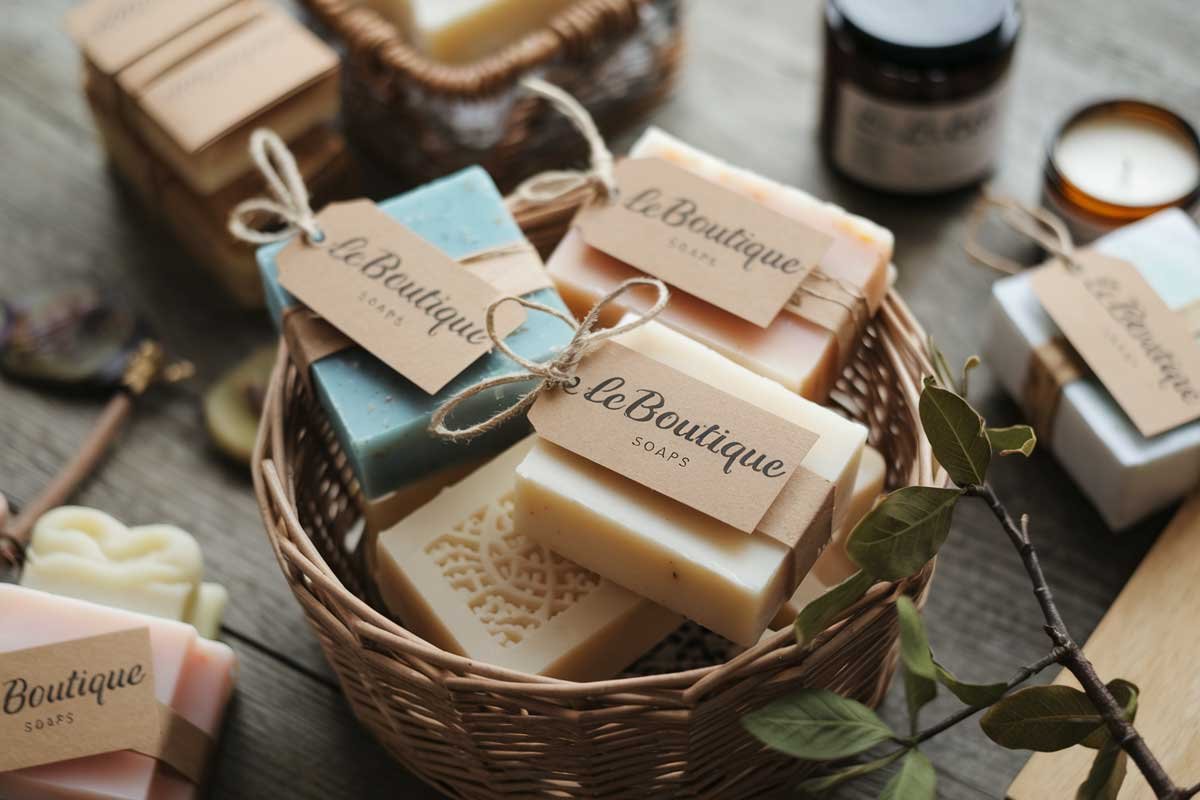Natural soap making dates back thousands of years, with ancient civilizations using plant oils and natural materials to create cleansing products. Today, handmade soaps crafted from natural ingredients continue this tradition while offering modern benefits for your skin and health.
Switching to handmade soap can improve your skin health while helping you avoid the harsh chemicals found in many commercial soaps. These gentle cleansers use ingredients like essential oils, natural butters, and plant-based materials that work together to clean and nourish your skin. The growing popularity of handmade soaps shows that more people are choosing natural alternatives for their daily care routines.

1) Gentle on Sensitive Skin
Your skin deserves special care, especially if it’s sensitive. Handmade soaps use gentle ingredients that work with your skin’s natural pH level of 5.5-7.0.
Many commercial soaps contain harsh chemicals that can irritate sensitive skin. Handmade soaps are different because they’re made with natural oils and butters that clean without stripping your skin’s protective barrier.
Natural yogurt-based handmade soaps can be particularly conditioning for your face. These soaps provide gentle cleansing while maintaining your skin’s moisture.
You’ll find that handmade soaps often include soothing ingredients like rose, jasmine, and violet. These natural components help calm irritated skin while cleaning effectively.
The careful formulation of handmade soaps has helped people with sensitive skin for many years. Each ingredient is chosen specifically to provide gentle cleansing without causing irritation.
2) Maintains Skin pH Levels
Your skin has a natural pH balance that helps protect it from harmful bacteria and environmental damage. Healthy skin pH typically ranges from 4.0 to 7.0, with an ideal level being slightly acidic.
Regular commercial soaps can be harsh on your skin because they have pH levels between 9 and 10. This high pH disrupts your skin’s natural balance and can leave it feeling dry and irritated.
Handmade soaps are crafted to maintain your skin’s natural pH levels. When you use handmade soap, you help preserve your skin’s protective barrier and keep its natural moisturizing factors intact.
Your skin works hard to keep itself healthy. Using pH-balanced handmade soap supports this process instead of working against it. The gentle cleaning action helps maintain the good bacteria on your skin while washing away dirt and excess oil.
By choosing handmade soap, you’re helping your skin stay in its optimal pH range. This promotes healthier, more balanced skin that can better protect itself from daily challenges.
3) Rich in Glycerin for Moisture
Glycerin is a natural byproduct of the soap-making process that makes handmade soap special. When you use commercial soaps, most of the glycerin has been removed and sold for other uses.
Glycerin acts as a natural humectant, which means it attracts and holds moisture to keep your skin hydrated. This helps prevent that tight, dry feeling you might get after using regular soap.
Your skin benefits from the moisturizing properties of glycerin every time you wash with handmade soap. The glycerin forms a light protective layer that locks in moisture while still letting your skin breathe.
High-quality handmade soaps contain more glycerin than mass-produced alternatives. This extra glycerin helps improve your skin’s texture and keeps it feeling soft throughout the day.
The glycerin content makes handmade soap especially good for dry or sensitive skin. You’ll notice the difference as your skin stays moisturized longer after washing.
4) Free from Synthetic Detergents

Natural handmade soaps give you a gentler cleaning experience compared to commercial products. Unlike mass-produced cleansers, handmade soaps don’t contain harsh synthetic detergents that can strip your skin of its natural oils.
Your skin benefits from the natural glycerin that forms during the traditional soap-making process. Many commercial manufacturers remove this glycerin to use in other products, replacing it with artificial detergents.
People with sensitive skin often notice improvements when switching to handmade soap. Clinical studies show that synthetic detergents can trigger skin irritation and dermatitis more frequently than natural soap ingredients.
The gentle cleansing action of handmade soap comes from its natural fatty acids. These work with your skin’s natural chemistry instead of disrupting it like harsh synthetics can.
When you choose handmade soap, you’re using a product that cleans effectively without relying on artificial foaming agents or synthetic surfactants. Your skin gets clean while maintaining its natural protective barrier.
5) Nourishing Natural Ingredients

Your skin craves natural nourishment, and handmade soaps deliver moisturizing benefits through carefully selected ingredients. These soaps contain pure plant oils and butters that feed your skin with vitamins and minerals.
Natural citrus ingredients like lime and lemon provide refreshing properties that wake up your skin. The essential oils in handmade soap give you aromatherapy benefits while cleansing.
Many handmade soaps include ingredients like oats, honey, and milk that soften your skin naturally. You’ll find nourishing additions like pomegranate and figs that help with gentle exfoliation.
When you use handmade soap, you know exactly what touches your skin. The natural ingredients work together to cleanse while keeping your skin’s moisture balanced. Your skin stays soft and healthy without harsh chemicals found in mass-produced soaps.
6) Eco-Friendly Packaging
Many handmade soap makers choose sustainable packaging materials like paper, cardboard, or biodegradable wrapping. This reduces plastic waste and helps protect the environment.
When you buy handmade soap, you can often get it with minimal or zero packaging. Some sellers let you bring your own containers or offer soap bars completely wrapper-free.
Your handmade soap purchase supports eco-friendly packaging practices that create less waste than mass-produced soaps in plastic containers. Many artisans use recycled materials for their packaging too.
You can refill containers with handmade soap instead of buying new plastic bottles each time. This simple switch helps cut down on packaging waste from liquid soaps and body washes.
The natural ingredients in handmade soaps mean their packaging can safely break down in the environment. You won’t have to worry about contributing to long-lasting plastic pollution.
7) Supports Small Businesses
When you buy handmade soap, you directly support local artisans and small business owners in your community. Your purchase helps these entrepreneurs continue their craft and maintain their livelihoods.
Small local businesses make up about 7% of local economies. By choosing handmade soap, you help these small-scale makers thrive and grow their operations.
Many soap artisans put great care into selecting quality ingredients and developing unique recipes. Your support allows them to keep creating natural products while maintaining high standards.
Shopping from small soap makers creates a personal connection. You often get to know the person making your soap and can learn about their process and passion for the craft.
Your choice to buy handmade soap helps create jobs in your area. It also keeps money circulating in your local community instead of going to large corporations.
Understanding the Natural Ingredients
Natural soaps contain carefully selected ingredients that work together to nourish and protect your skin. Each component serves a specific purpose in creating an effective cleanser.
Essential Oils and Their Benefits
Natural essential oils add both pleasing scents and therapeutic properties to handmade soaps. Lavender oil helps calm irritated skin while tea tree fights bacteria.
Peppermint oil provides a cooling sensation and can help relieve itchy skin. Eucalyptus oil works as a natural decongestant when you use the soap in a hot shower.
Your skin absorbs these beneficial compounds during washing. Unlike artificial fragrances, pure essential oils offer real skincare benefits beyond just a nice smell.
Natural Exfoliants
Adding natural exfoliants helps remove dead skin cells and leaves your skin feeling fresh. Popular options include:
- Ground oatmeal (gentle enough for sensitive skin)
- Coffee grounds (helps reduce puffiness)
- Poppy seeds (provides light scrubbing action)
- Crushed almonds (rich in vitamin E)
Coffee grounds in soap can help reduce inflammation while gently polishing your skin. The natural oils in ingredients like crushed almonds provide extra moisture during exfoliation.
Choose soaps with exfoliants that match your skin’s sensitivity level. Finer particles work better for delicate facial skin, while coarser grounds are great for body soaps.
Environmental Impact
Natural handmade soaps create less waste and use fewer harsh chemicals compared to mass-produced commercial soaps. Your choice of handmade soap helps protect the earth’s resources and reduces pollution.
Eco-Friendly Packaging
Handmade soaps often come with minimal packaging made from sustainable materials. Most artisans use simple paper wrapping or cardboard boxes that break down naturally.
You’ll find many handmade soap makers skip plastic packaging entirely. They opt for reusable or compostable materials like fabric bags, kraft paper, or recycled boxes.
This reduced packaging means less waste in landfills. When you buy handmade soap, you’re helping cut down on the billions of plastic bottles discarded each year from liquid soap products.
Sustainable Sourcing
Natural ingredients in handmade soaps come from renewable plant sources like olive oil, coconut oil, and essential oils. These ingredients require less processing than synthetic chemicals.
Many soap makers choose locally sourced materials. This cuts down on transportation emissions and supports local farmers.
Your handmade soap likely contains plant-based oils that are biodegradable. These break down naturally without harming water systems or soil quality.
Small-batch production uses less energy than large factories. Handmade soap makers typically work with simple tools and minimal equipment, reducing their carbon footprint.


